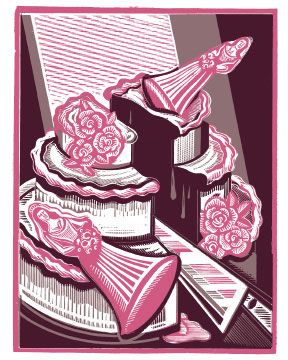If the arguments made in American courts against same-sex marriage were the real reasons for opposition to it, there would be a lot less opposition than there is. In fact, there would be virtually no opposition at all.
You doubt it? Find some opponents and ask if they’d change their minds if SSM turns out not to adversely affect opposite-sex marriage, parent-child bonding, the abortion rate, etc. Dollars to donuts, they will all stick to their position. Why? Because their real reasons for opposing SSM are religious. They believe their faith proscribes it.
But whether they like it or not, the constitutional ban on religious establishments — the separation of church and state — won’t permit them to tell the Supreme Court: “Leviticus condemns gay sex and therefore the United States must not permit a man to marry another man.” So they have to come up with non-faith-based arguments.
I’m not suggesting that the opponents are necessarily insincere in claiming that SSM will have adverse social effects; and who knows, they may even be right (though I very much doubt it). But what they’re really concerned about is the adverse effect of societal recognition of SSM on their own lives as religious individuals and communities. And, to the extent that opposition to SSM is a deeply held religious value of theirs, they have reason to be concerned.
In this week’s oral argument before the Supreme Court in Obergefell v. Hodges, Justice Scalia insisted that a determination of a constitutional right to SSM would mean requiring clergy to perform same-sex weddings. This concern was contested by plaintiff’s attorney Mary Bonauto and waved away by Justice Kagan, who pointed out that a rabbi is not obliged to marry a Jew and a non-Jew, even though such a marriage is constitutionally guaranteed.
Chief Justice Roberts dismissed Scalia too, though more gently. “We have a concession from your friend that clergy will not be required to perform same-sex marriage, but there are going to be harder questions,” he told Solicitor General Donald Verrilli. “Would a religious school that has married housing be required to afford such housing to same-sex couples?” Verrilli gave a complicated response that suggested that the answer would come down to how particular states decided to enforce their civil rights laws.
Then, noting that the Court had determined (in the 1983 Bob Jones case) that a college was not entitled to a tax exemption if it opposed inter-racial dating or marriage, Justice Alito asked Verrilli, “So, would the same apply to a university or a college if it opposed same-sex marriage?” That, Verrilli conceded, “is going to be an issue.”
Why should a religious objection to same-sex marriage be given greater deference than a religious objection to mixed-race marriage? If the only reason is that in many jurisdictions there is no law against discrimination based on sexual orientation (as opposed to race or gender), that just begs the question.
You might say that Bob Jones was wrongly decided, and that an institution of higher learning that institutionalizes racial separation for religious reasons should have been allowed to do so without losing its tax exemption. But if you agree with the result in Bob Jones, I don’t see how you can uphold a comparable institution’s right to discriminate against same-sex relationships. Likewise, I don’t see how florists and bakers can be denied the right to refuse their services to mixed-race couples while being permitted to refuse their services to same-sex couples.
Now consider the following scenario:
A man and a woman walk into a bakery and order a cake for their upcoming wedding. “Do you want an inscription with your names on it?” asks the baker. “Yes we would,” says the woman. “Just ‘Alice and George’ will do.” “Oh, and by the way,” says the baker. “Have either of you been divorced?” “Why yes,” George replies. “I was divorced 20 years ago.” “Sorry,” says the baker. “Divorce is against my religion. Jesus said, ‘What God has joined together, let no one separate.’ I’m a Catholic and my church won’t marry a divorced couple. I won’t cooperate either. Find yourself another baker.”
So far as I know, this has never occurred. But should the law allow it?






